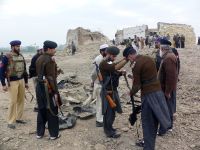Die-hard support for ousted leader Slobodan Milosevic continues to hamper the day-to-day task of reform in Yugoslavia despite the Western euphoria generated by President Vojislav Kostunica's election.
The bitter struggle for control of Serbia's government, the real seat of power in Yugoslavia and still dominated by Milosevic loyalists, only highlighted the uphill task facing pro-Kostunica reformers.
Milosevic's Socialists (SPS), with 110 seats in the 250-member assembly, beat a tactical retreat over opposition demands for certain names to be dropped from a power-sharing cabinet.
But Zoran Djindjic, the key player in the 18-party Democratic Opposition of Serbia (DOS) -- and often regarded as the kingmaker in Kostunica's new kingdom, was under no illusions about Milosevic's lingering influence.
Djindjic said Monday he wanted to see the former strongman, whose much-trumpeted return to the SPS stage occurred on the eve of the government dispute, "disappear" from Yugoslavia's public life.
"We want Milosevic to disappear from the political scene, and we will not permit him to make any political appearance," the DOS leader added.
Reports of Milosevic's disappearance -- either to Russia or China -- since the October 5 popular uprising on the streets of Belgrade swept Kostunica to the presidency have been wildly exaggerated.
The ousted leader continues to menace Yugoslavia's fragile democracy from behind the scenes, and his enduring appeal to a disadvantaged minority was encapsulated Monday by a lone demonstrator outside Serbia's parliament building.
Sava Tomic, 47, an unemployed father of four, was protesting about the sharp rise -- in some cases up to 40 percent -- in the price of basic foodstuffs since the Milosevic regime, with its artificial price controls, was deposed.
He was wearing a badge emblazoned with the letters DOS, the acronym of the pro-Kostunica coalition, but in this case spelling "Dolazi Opet Slobo", or "Come Back Slobo" in Serb.
"The people who voted for Kostunica were tricked by the opposition, who were manipulated by the United States and the European Union, and I do not like that," he said.
Young Milosevic supporters are harder to find, and, like their older colleagues, most of them at present prefer to remain silent or anonymous.
Milosevic’s electoral backing came largely from the older and rural population. Various electoral figures showed that Milosevic won between 35 and 40 percent of votes at the September 24 presidential polls.
Cedomir Jovanovic, a high-level DOS official, warned last week that Milosevic could play on the hardships faced by many Serbs until much-vaunted international aid comes on line to destabilize the process of reform.
The European Union has promised to start delivering 200 million euros (172 million dollars) in aid by November but the money cannot be paid until governments are installed not only in Serbia but also at federal level.
Some analysts believe Milosevic is seeking to prolong the hiatus by obstructing the new Serbian government and DOS politicians loyal to Kostunica, who won the symblic but largely ceremonial federal presidency.
Even Djindjic acknowledged Monday that the reformers' top priority was to rebuild the economy and to provide for heating and basic foodstuffs in the short term.
"If we, as the democratic opposition in government, do not manage to satisfy the people's elementary needs -- and this is power, heating, foodstuffs, and pharmaceuticals -- it may very well be that the people are disappointed immediately.
"Because our biggest promise was to take the country back to Europe immediately and that we would get support from Europe," he said.
Djindjic, 48, has emerged as an influential power broker in the new regime but relations are not always smooth within the unwieldy DOS coalition and he has already faced charges of opportunism.
Indeed Kostunica has accused Djindjic of undermining the fledgling democracy by consolidating the mass uprising in ways that could be "confusing," an apparent reference to the shady ousting of Milosevic-era business chiefs.
Some pro-democracy reformers fear Milosevic will exploit the insecurity and disgruntlement felt by many Serbs during the period of transition to orchestrate his political comeback -- BELGRADE (AFP)
© 2000 Al Bawaba (www.albawaba.com)







